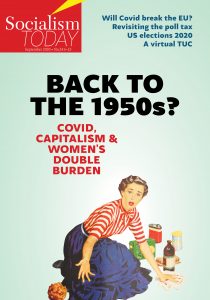An absorbing new book looks at the changing patterns of women’s work in Britain since the industrial revolution. With Covid-19 potentially marking a new pivotal moment in the history of women’s employment, it could not have been published at a more opportune moment, writes CHRISTINE THOMAS.
Double Lives: a history of working motherhood
By Helen McCarthy
Published by Bloomsbury, 2020, £21

There is hardly any aspect of society that has not been seriously impacted by the coronavirus pandemic. One of its main consequences has been to magnify and exacerbate all of the existing inequalities in capitalist society. The interplay of class and race, for example, has influenced who catches the virus, its severity, and how likely people are to die from it. The same factors determine who suffers from the economic fallout.
The interaction between class and gender inequalities has also been highlighted and intensified. While it’s true that men with coronavirus are more likely to become seriously ill or die, women – working-class women in particular – are more likely to work in areas where there is a greater exposure to Covid-19. They have been 30% more likely to be furloughed, 47% more likely to have lost their jobs, and 50% more likely to have had their hours cut.
Read more